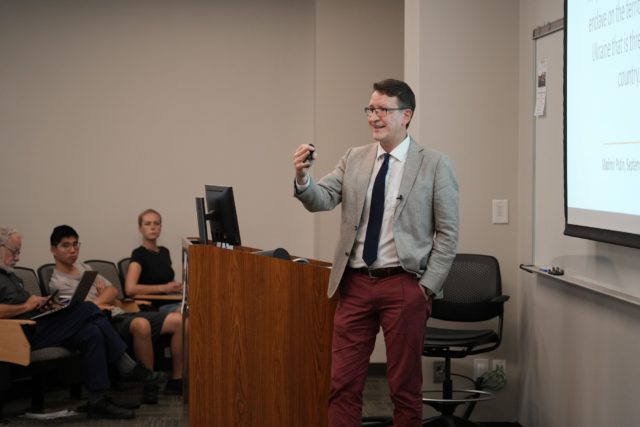By Camille Cox | Staff Writer
Dr. Sergiy Kudelia, associate professor of political science, gave his first lecture in the series “Understanding the Russian-Ukrainian War” on Thursday in Draper Academic Building.
Russia launched a full-scale invasion of Ukraine on Feb. 24. As of July 25, the United Nations reported a total of 5,237 deaths from the war.
Kudelia, who is from Ukraine, said he concentrates his research on the dynamics of war and regime changes, specifically in Ukraine, Russia and the former Soviet Union. His first lecture, in a series of four, focused on the question of “Why 22 Years of Peace?”
“When we look at these 22 years, we certainly see very clear patterns that lead us to conclude that war could have happened,” Kudelia said. “And in fact, what we see today is an accumulation of preparations by the Russian leadership and by the members of the Russian public to this war.”
Kudelia said Russian president Vladimir Putin’s recent statements to the Russian public have made false claims about the ongoing war.
“If you look at the historical record with the Soviet Union, you will see that top Russian leaders refused to accept Ukraine’s claim over its own statehood,” Kudelia said. “Through various nonviolent means, especially under Vladimir Putin, you’ve seen years of intervention to weaken Ukraine, to undermine Ukrainian statehood, and when all of these attempts failed, he ran out of options and decided to use force.”
Kudelia walked through the timeline of the bubbling issue between the two states throughout the 20th and 21st centuries. He said along with historic border conflict, Russia has utilized a cultural lever to gain Ukrainian territory. The Revolution of Dignity in 2013 serves as a turning point in the relationship between Ukraine and Russia.
“This demonstrated to Putin that all of the levers he has been using so far were quite ineffective to get him what he wants,” Kudelia said. “And he wanted to stop Ukrainian movement to the Western Union, to the European Union and to NATO, and he wanted to make sure that Ukraine remains part of an alliance with Russia.”
Scottsdale, Ariz., junior Shelby Johnson said prior to the lecture, she did not know the conflict had developed over the past 22 years.
“At some point in time, there was always going to be an attack on Ukraine,” Johnson said. “At least Russia kind of portrayed an interest in recapturing it and always having a hold on it.”
Kudelia’s second lecture in the series will take place on Oct. 6 in Room 345 of Draper Academic Building; it is titled “Crimea and Donabas: How Russia’s War on Ukraine Started.” The lectures are free and open to the public.


